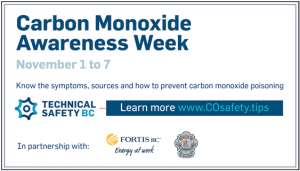
Carbon Monoxide Awareness Week – November 1-7, 2021
The effects of carbon monoxide poisoning can be devastating. According to the BC Coroners Service, there were 151 carbon monoxide (CO) poisoning deaths in the province between 2008 and 2020, some of which were preventable. By properly maintaining all fuel-burning appliances in a home, and installing a carbon monoxide alarm that alerts when the gas is present, we can all stay safe.
To raise awareness about the seriousness of carbon monoxide poisoning and how to prevent it, the Office of the Fire Commissioner is once again partnering with Technical Safety BC and FortisBC to host the third annual Carbon Monoxide Awareness Week from November 1 to 7.
What is carbon monoxide and why is it dangerous?
Carbon monoxide is an odourless, tasteless, invisible gas that is produced by burning fuels such as: propane, natural gas, oil, wood, charcoal, alcohol, kerosene, or gasoline — all of which are commonly used in your home, RV, boat, or business.
Exposure to carbon monoxide can be deadly. Carbon monoxide interferes with the body’s ability to absorb oxygen, which can lead to serious illness, severe side effects, or death.
What are the symptoms of carbon monoxide poisoning?
- Headaches
- Confusion
- Vomiting
- Weakness
- Dizziness
- Chest pains
As carbon monoxide builds up in the bloodstream, symptoms change and will magnify. Look out for:
- Increased confusion and drowsiness
- Fast breathing, fast heartbeat, or increased chest pain
- Vision problems
- Seizures
What to do if you suspect carbon monoxide poisoning?
If you believe you’re being poisoned by CO, or if your CO alarm goes off, take these steps immediately:
- Turn off your appliances
- Get everyone out of the building, including pets
- Call 911 or your local emergency number
- Seek medical attention.
If you are unable to leave your home, move next to an open window or an open door. Don’t return to the area until you’re sure it’s safe—if you’re not sure, wait for the fire department or Fortis BC to tell you everything is OK.
For more information:
Carbon Monoxide Safety Brochure
Kukwstsétsemc,
| Supporting BC First Nation Communities Since 1986 | Jo-Anne Hales, MSc, PAg | ||
| Communications Officer | |||
| Cell: 250.462.1752 | |||
| Kamloops Office Tk’emlúps te Secwépemc Traditional Territory | |||
| BC Toll Free: 1.888.388.4431 Fax: 250.377.7610 | |||
| Vancouver Office Squamish Nation Traditional Territory | |||
| BC Toll Free: 1.888.822.3388 Fax: 604.669.9832 | |||
| https://www.fness.bc.ca | |||
| Membership Makes a Difference! | FNESS Emergency Contacts | ||
| In response to the COVID-19 pandemic, we have temporarily closed our offices. FNESS employees are working from home and continue to deliver the highest level of service to all First Nation Communities. | |||
The effects of carbon monoxide poisoning can be devastating. According to the BC Coroners Service, there were 151 carbon monoxide (CO) poisoning deaths in the province between 2008 and 2020, some of which were preventable. By properly maintaining all fuel-burning appliances in a home, and installing a carbon monoxide alarm that alerts when the gas is present, we can all stay safe.
To raise awareness about the seriousness of carbon monoxide poisoning and how to prevent it, the Office of the Fire Commissioner is once again partnering with Technical Safety BC and FortisBC to host the third annual Carbon Monoxide Awareness Week from November 1 to 7.
What is carbon monoxide and why is it dangerous?
Carbon monoxide is an odourless, tasteless, invisible gas that is produced by burning fuels such as: propane, natural gas, oil, wood, charcoal, alcohol, kerosene, or gasoline — all of which are commonly used in your home, RV, boat, or business.
Exposure to carbon monoxide can be deadly. Carbon monoxide interferes with the body’s ability to absorb oxygen, which can lead to serious illness, severe side effects, or death.
What are the symptoms of carbon monoxide poisoning?
- Headaches
- Confusion
- Vomiting
- Weakness
- Dizziness
- Chest pains
As carbon monoxide builds up in the bloodstream, symptoms change and will magnify. Look out for:
- Increased confusion and drowsiness
- Fast breathing, fast heartbeat, or increased chest pain
- Vision problems
- Seizures
What to do if you suspect carbon monoxide poisoning?
If you believe you’re being poisoned by CO, or if your CO alarm goes off, take these steps immediately:
- Turn off your appliances
- Get everyone out of the building, including pets
- Call 911 or your local emergency number
- Seek medical attention.
If you are unable to leave your home, move next to an open window or an open door. Don’t return to the area until you’re sure it’s safe—if you’re not sure, wait for the fire department or Fortis BC to tell you everything is OK.
For more information:
Carbon Monoxide Safety Brochure
Kukwstsétsemc,
| Supporting BC First Nation Communities Since 1986 | Jo-Anne Hales, MSc, PAg | ||
| Communications Officer | |||
| Cell: 250.462.1752 | |||
| Kamloops Office Tk’emlúps te Secwépemc Traditional Territory | |||
| BC Toll Free: 1.888.388.4431 Fax: 250.377.7610 | |||
| Vancouver Office Squamish Nation Traditional Territory | |||
| BC Toll Free: 1.888.822.3388 Fax: 604.669.9832 | |||
| https://www.fness.bc.ca | |||
| Membership Makes a Difference! | FNESS Emergency Contacts | ||
| In response to the COVID-19 pandemic, we have temporarily closed our offices. FNESS employees are working from home and continue to deliver the highest level of service to all First Nation Communities. | |||